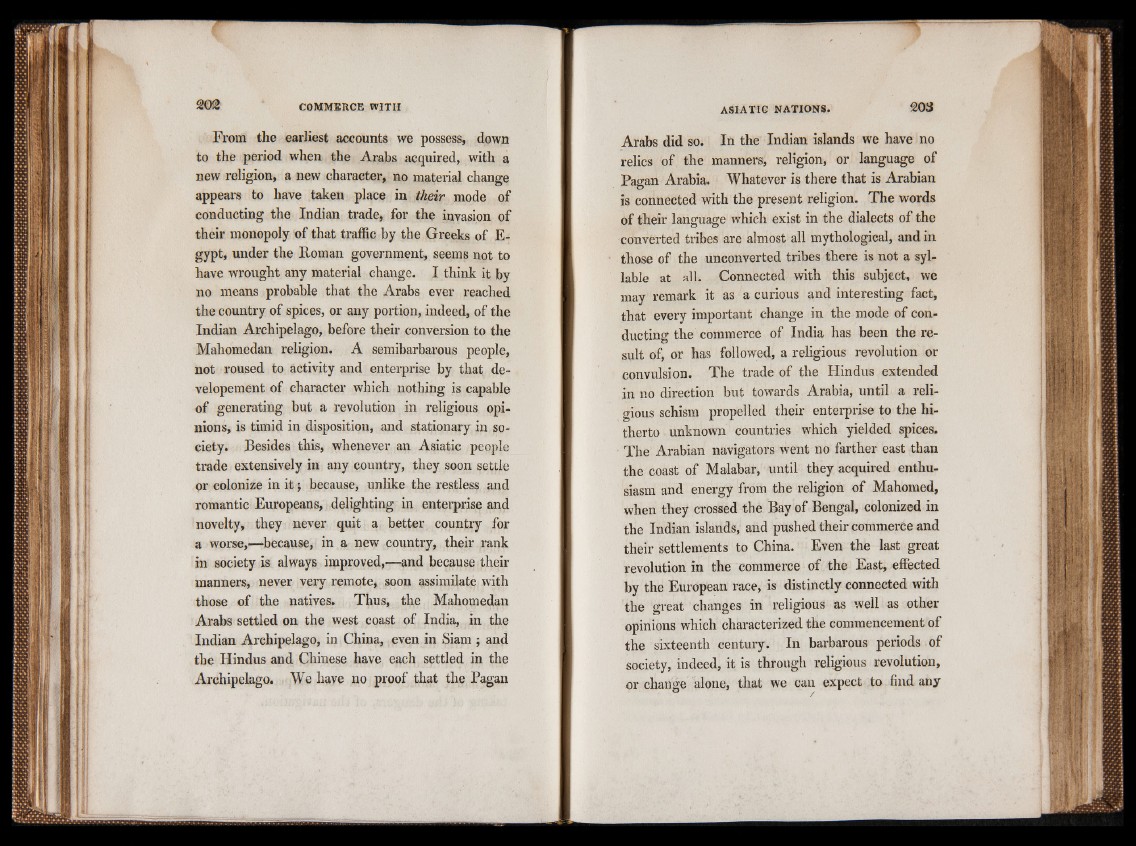
From the earliest accounts we possess, down
to the period when the Arabs acquired, with a
new religion, a new character, no material change
appears to have taken place in their mode of
conducting the Indian trade, for the invasion of
their monopoly of that traffic by the Greeks of E-
gypt, under the Roman government, seems not to
have wrought any material change. I think it by
no means probable that the Arabs ever reached
the country of spices, or any portion, indeed, of the
Indian Archipelago, before their conversion to the
Mahomedan religion. A semibarbarous people,
not roused to activity and enterprise by that de-
velopement of character which nothing is capable
of generating but a revolution in religious opinions,
is timid in disposition, and stationary in society.
Besides this, whenever an Asiatic people
trade extensively in any country, they soon settle
or colonize in it \ because, unlike the restless and
romantic Europeans, delighting in enterprise and
novelty, they never quit a better country for
a worse,—because, in a new country, their rank
in society is always improved,—and because their
manners, never very remote, soon assimilate with
those of the natives. Thus, the Mahomedan
Arabs settled on the west coast of India, in the
Indian Archipelago, in China, even in Siam ; and
the Hindus and Chinese have each settled in the
Archipelago. We have no proof that the Pagan
Arabs did so. In the Indian islands we have no
relics of the manners, religion, or language of
Pagan Arabia. Whatever is there that is Arabian
is connected with the present religion. The words
of their language which exist in the dialects of the
converted tribes are almost all mythological, and in
those of the unconverted tribes there is not a syllable
at all. Connected with this subject, we
may remark it as a curious and interesting fact,
that every important change in the mode of conducting
the commerce of India has been the result
of, or has followed, a religious revolution or
convulsion. The trade of the Hindus extended
in no direction but towards Arabia, until a religious
schism propelled their enterprise to the hitherto
unknown countries which yielded spices.
The Arabian navigators went no farther east than
the coast of Malabar, until they acquired enthusiasm
and energy from the religion of Mahomed,
when they crossed the Bay of Bengal, colonized in
the Indian islands, and pushed their commerce and
their settlements to China. Even the last great
revolution in the commerce of the East, effected
by the European race, is distinctly connected with
the great changes in religious as well as other
opinions which characterized the commencement of
the sixteenth century. In barbarous periods of
society, indeed, it is through religious revolution,
or change alone, that we can expect to find any